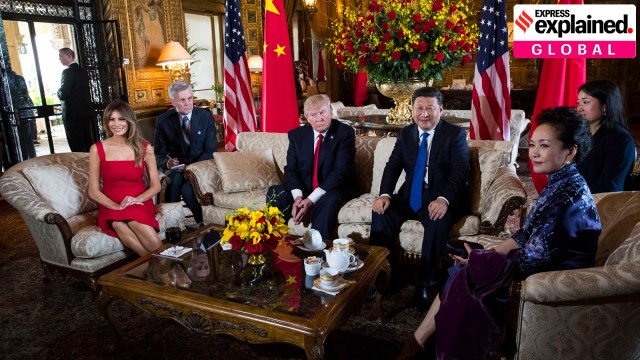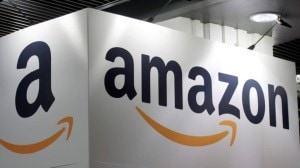Expert Explains: How the prospect of Trump 2.0 has created two warring factions within China
Will Trump be vengeful towards China or will the 'king of dealmaking' prove better than Biden? China is hotly debating this question.
 Then-President Donald Trump and first lady Melania Trump meet with President Xi Jinping of China and his wife, Peng Liyuan, at Trump’s Mar-a-Lago estate in Palm Beach, Fla., April 6, 2017. (Doug Mills/The New York Times)
Then-President Donald Trump and first lady Melania Trump meet with President Xi Jinping of China and his wife, Peng Liyuan, at Trump’s Mar-a-Lago estate in Palm Beach, Fla., April 6, 2017. (Doug Mills/The New York Times)Early on during the 2020 election campaign, US President-elect Donald Trump had claimed, “China will do anything they can to have me lose this race.” Trump eventually did lose the election.
This time after his victory — and with his appointment of known China hawks Marco Rubio as secretary of state and Mike Waltz as national security advisor — speculation is high in Beijing that Trump 2.0 is going to be angry and vengeful. But others believe he can’t be worse than Joe Biden, and that the ‘King of Understanding’ might still be open to ‘deal making’ with China.
In the run-up to the US election, Chinese leaders and the state media had maintained a neutral stance, saying they don’t see a difference between the candidates.
Now, two broad moods seem to be prevailing — the fatalistic pessimism of those who think trying to fight the Trump presidency is pointless; and the tactical optimism of those who believe some good can be brought about from Trump 2.0. The differences between the two groups are getting increasingly acrimonious. Here’s why.
Trump’s ‘dream team of China hawks’
In simple words, the sociological phrase ‘fatalistic pessimism’ can be described as the belief that things will turn out badly and nothing can be done to change the outcome. In the China versus Trump 2.0 scenario, both pessimism and fatalism are shaping a section’s outlook. They are convinced Trump will use his term for a bitter trade and tariff war against China.
As the names of Trump’s cabinet picks come out, a large number of op-ed articles, editorials, and commentaries have been appearing in both Chinese official/semi-official print media and on the digital and social media.
The popular digital news platform guancha.cn recently reminded its readers in an article that Rubio has been sanctioned by China. Trump sees “China as the first dam blocking the US ‘MAGA’ flood,” the article said.
Da Wei, the prestigious Tsinghua University IR professor considered among the top-ranking Chinese experts on Sino-US relations, told a packed seminar in Hong Kong last week: “China must not fall into the ‘trap’ set by Trump and should not take tit-for-tat tariff measures, so as not to fall into the vicious cycle of multiple rounds of mutual tariffs again.”
Echoing similar sentiments, Chen Feng, known for his regular columns in the Chinese media and currently professor at the Alberta University in Canada, said: “We don’t need to have unrealistic fantasies…Trump will definitely strike hard at China.”
‘Pessimists are cosying up to the US’
Tactical optimism is basically a cautious expectation of, and efforts towards, success.
Thus, some influential Leftist scholars, like Zhang Zhikun, are advocating a positive, practical attitude in their strategy to deal with Trump 2.0. In a column in one of China’s leading Leftist digital platforms, Zhang welcomed Trump’s victory, saying it could result in “three good things.” Zhang’s “good things” are in the context of “exposing” or ridiculing scholars whom the Leftists term “elites in favour of liberal Western values.”
These three things are: unmasking those Chinese in the business world and academia and who are scared of condemning the “US hegemony”; exposing those Chinese who propagate that China and US are mutually dependent and cannot do without each; and bursting fantasies of the “public intellectuals” who “seriously suffer from the political delusion that the US and the Western hegemony have no will to destroy the communist China.”
Ever since the deterioration in US-China relations following Trump’s “tariff war” against China in 2018, this political and ideological “war of words” has been intensifying in China — some say even within the Chinese Communist Party (CCP). “Pro-America” and “anti-US hegemony” are now among the top trends on Chinese social media platforms, such as Weibo, WeChat, sina.com, and xiaohongshu.com (littleredbook.com) etc.
Despite the internal wrangling, regarding the direction US-China ties could take, Yun Sun, director of the China Programme at Washington’s prestigious Stimson Centre, summed up the mood: “There is no best-case scenario. There’s only the bad scenario and the worse scenario.”
- 01
- 02
- 03
- 04
- 05






































